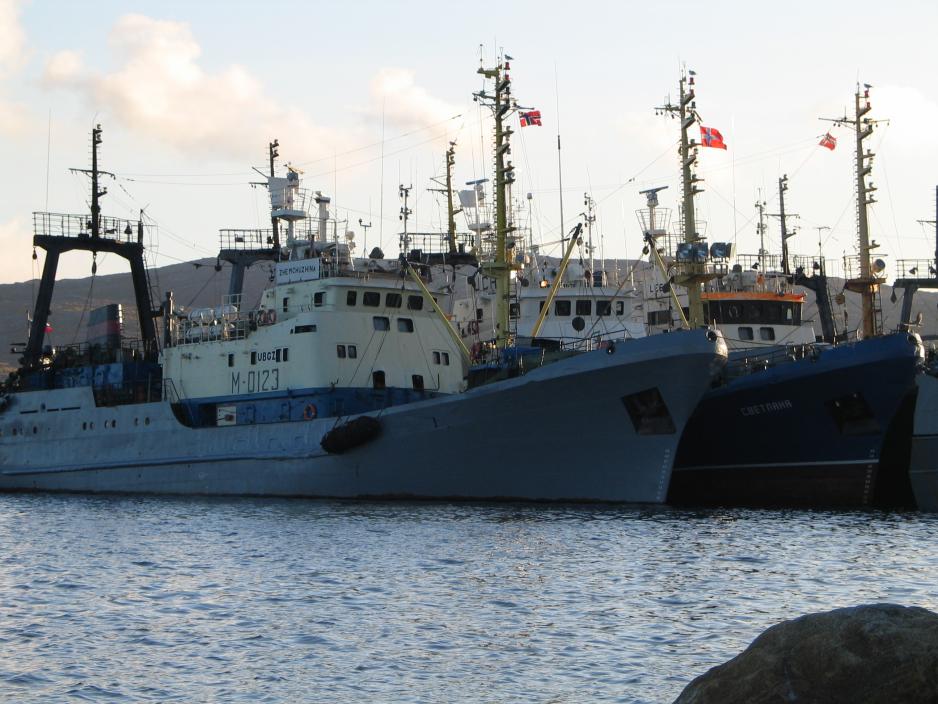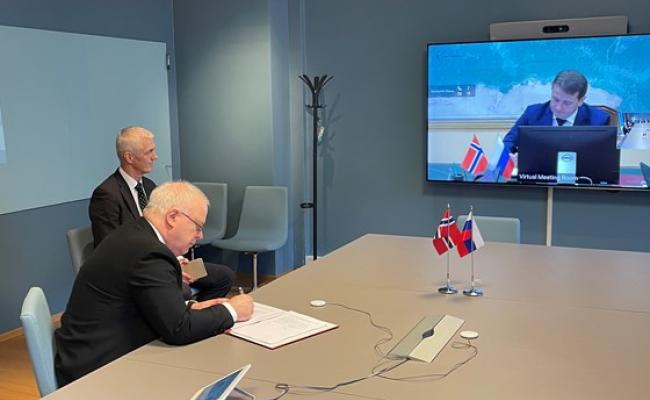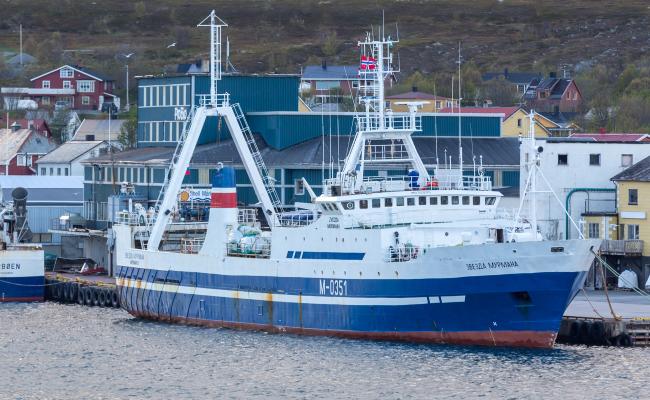Norwegian Minister of Fisheries: “Fisheries Negotiations With Russia Are Demanding”
The Norwegian Fisheries Minister Marianne Sivertsen Næss (Labor) gave a speech at Agenda Nord-Norge 2025 in Bodø. (Photo: Trine Jonassen)
Bodø, Northern Norway (High North News): After Norway's introduction of EU sanctions against two Russian shipping companies, the Norwegian-Russian fisheries negotiations have come to a halt after 50 years of cooperation. "It is demanding," says Minister of Fisheries, Marianne Sivertsen Næss (Labor). The parties are now working toward a meeting in the Joint Norwegian-Russian Fisheries Commission, but Næss says they are no closer to setting a date for negotiations.
The date for negotiations about next year's cod quotas in the Joint Norwegian-Russian Fisheries Commission had not yet been set, despite two extraordinary meetings between the parties.
The negotiations, in which the parties set quotas for the cod in the Barents Sea, among others, usually take place in October every year.
The Norwegian Fisheries Minister Marianne Sivertsen Næss (Labor) says the situation is more demanding this time around.
Two meetings
What is the status of the fisheries agreement with Russia at this point?
"We have had two extraordinary meetings, one in August and one on October 6th. We talked about Norway following the EU's sanctions regime in regards to the two Russian shipping companies that have been listed, among other things, says Næss to High North News.
At the end of August, Russia announced retaliatory measures after the Norwegian government decided to list the two Russian fishing companies, Norebo JSC and Murman Seafood.
The measures entail that ships belonging to the two shipping fisheries companies will lose access to Norwegian ports and territorial waters. Licenses for fishing in the Norwegian economic zone will not be granted to vessels from the two companies.
Of different opinions
"We naturally have different opinions when assessing this in the context of the fisheries agreement and the cooperation on both mutual access to fishing in each other's economic zones, research and quota setting," says Næss.
She says the parties are working to arrange a meeting of the joint Norwegian-Russian Fisheries Commission to continue the fisheries cooperation between Norway and Russia that has lasted for almost 50 years.
"But we are aware that we have different opinions on whether the listing of the shipping companies has any significance in the cooperation and negotiations."
Also read (the article continues below)
Mutual interest
Are you getting closer to setting a date for the meeting?
"No, a date has not been set. But we have both communicated the importance of having a meeting."
How demanding are the negotiations compared to previous years?
"This is naturally demanding. We are living in a demanding time. There is a greater picture here, and that is that we have followed the EU's sanctions regime with the listing of the two shipping companies, which has led to bigger challenges this year. But we are working toward a commission meeting so that we can continue as before."
No political contact
What is the communication like? Is it equal for both parties, or is Norway the initiator?
"Everything is taking place on an official level, at a technical-administrative level. We have no political contact."

Russian trawlers docked in Kirkenes, Northern Norway. Russian fishing vessels will continue to be able to call at ports in this border town, as well as in Båtsfjord on the north side of the Varanger Peninsula and in the northern Norwegian city of Tromsø. (Photo: Jechstra)
What signals have you received from Russia regarding the sanctioned shipping companies?
"We are of different opinions when it comes to whether following the EU sanctions regime is significant to the fisheries agreement. We are aware that Russia believes there is no violation."
Ports still open
She notes that the rest of the Russian fisheries fleet with licensed vessels can continue to fish in the Norwegian economic zone as before.
"They can deliver their catch in the three ports still open and exempt from the port ban. They can still deliver fish in Båtsfjord, Kirkenes, and Tromsø," says the fisheries minister.
Næss emphasizes the importance of the Norwegian agreement with Russia, which includes research, quotas, and being able to fish in each other's economic zones.
Following the EU
Does the government regret implementing the EU's sanctions on the shipping companies?
"We are very clear that we are following the EU and the sanctions regime following the brutal war of aggression from Russia against Ukraine. We are clear on the fact that we are following the EU's sanctions."
Ilya Shestakov, Head of the Federal Agency for Fishery in Russia, said to the Russian state news agency TASS in August that the country would close its exclusive economic zone for Norwegian fishing vessels if the Norwegian side did not reconsider its position within a month.
"Furthermore, fisheries and the allocation of quotas in the open waters in the Barents and Norwegian Seas will be carried out on the basis of Russian national interests," he added.
More demanding
What can you say about the quota situation in light of Russia's threats?
"It is more demanding considering the quota reduction. There is also concern that if we cannot reach a fisheries agreement, the Russian side may choose to fish more in the Russian economic zone. This would result in Russia catching a bigger volume of small fish than fishing in the Norwegian economic zone, where the fish are bigger," explains Næss.
She says there are many things to consider.
"Both short and long term, which means that we want to reach an agreement with Russia, which we have had for almost 50 years."
What does the timeline toward a final agreement look like?
"We are working to find a date, so there is contact, but the date has not been set," concludes Marianne Sivertsen Næss.
The fisheries negotiations in short
- The fisheries negotiations between Norway and Russia take place in the Joint Norwegian–Russian Fisheries Commission.
- The parties meet annually to set quotas for the upcoming year for the following stocks in the Barents Sea: north-east arctic cod, north-east arctic haddock, capelin, Greenland halibut, and redfish.
- The commission also agrees on mutual fisheries in each other's zones.
- The quota advice for the Barents Sea is usually anchored in the International Council for the Exploration of the Sea (ICES). But due to the war in Ukraine, ICES suspended Russia in March 2022.
- Norway has exempted Norwegian-Russian fisheries cooperation from the sanctions against Russia. Therefore, the quota advice is bilateral and delivered by the research group in the Norwegian-Russian Fisheries Commission.
Source: Regjeringen.no and Norwegian Institute of Marine Research.




